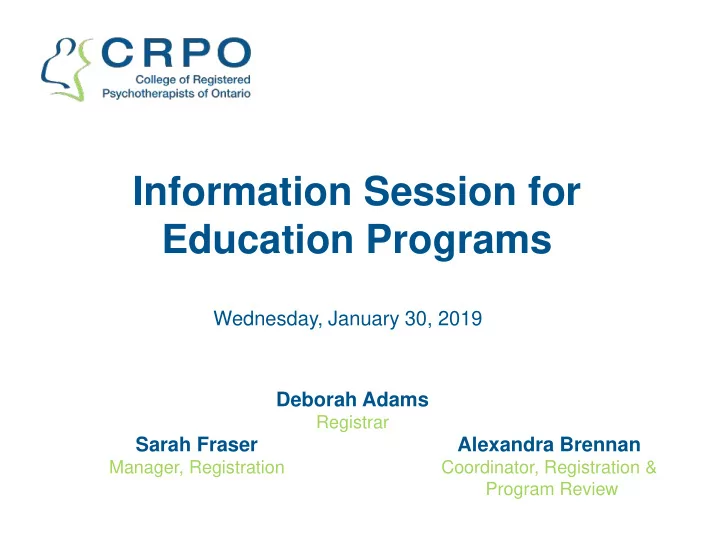

Information Session for Education Programs Wednesday, January 30, 2019 Deborah Adams Registrar Sarah Fraser Alexandra Brennan Manager, Registration Coordinator, Registration & Program Review
Agenda 1. Registration Requirements and Membership Categories for Applicants 2. Controlled Act of Psychotherapy and Supervision 3. Review and Recognition 4. Private Career Colleges Act
Pillars of Sustainable Profession
Registration Requirements for Applicants • Master’s level program central to psychotherapy • Jurisprudence e-Learning Module • Fluent in English or French • “Current” in the profession • Good character • Professional liability insurance
Application Process Recognized Non-recognized ✓ Select ✓ Indicate education was completed Recognized ✓ Submit transcript or credential program from drop down evaluation from WES menu ✓ Complete Mapping Tool ✓ Submit ✓ Submit course outlines transcript ✓ Pay additional review fee
Information to Relay to Students • Submit application in final semester • Submit within two years of completing JRP module • Transcript must be sent from institution directly to CRPO
Resources and Templates o Supporting Documents Checklist o DCC Confirmation Form and Clinical Supervision Attestation Form o Entry-to-Practice Competency Profile o Professional Practice Standards o Code of Ethics o Controlled Act Task Group Documents o Public Register Update Form o Exam Resource Manual o Exam Self-Assessment Tool and Workbook
Category Transfers RP (Qualifying) o Complete education o Accumulate 450 DCC and 100 CS o Practice with regular CS o Pass Registration Exam RP without independent practice o Accumulate 1000 DCC and 150 CS o Practice with regular CS RP with independent practice o Not required to practice with CS
Entry-to-Practice Registration Examination • Canadian Professional Standard for Counselling and Psychotherapy (CPSCP): Entry to Practice Competency Assessment • COMPASS Centre for Examination Development • Currently offered twice a year • Max of 3 attempts at the exam (first attempt must be taken within first 2 years of submitting CRPO application)
Snapshot of Exam Writers in 2018 Location of Education Program 2% 2% Ontario (253) 9% 9% Other CAD Province (166) USA (41) 54% 54% 35% 35% Other International (9) Total Attempts in 2018 = 469
Snapshot of Exam Writers in 2018 Recognition Status of Program Completed Recognized (309) 34% Non-recognized (160) Total Attempts in 2018 = 469 66%
Scope of Practice of Psychotherapy The practice of psychotherapy is the assessment and treatment of cognitive, emotional or behavioural disturbances by psychotherapeutic means, delivered through a therapeutic relationship, based primarily on verbal or non-verbal communication.
Controlled Act of Psychotherapy
Controlled Act of Psychotherapy Exceptions 29 (1) An act by a person is not a contravention of subsection 27 (1) if it is done in the course of, (b) fulfilling the requirements to become a member of a health profession and the act is within the scope of practice of the profession and is done under the supervision or direction of a member of the profession ;
Who Can Supervise Who? Students and Graduates RP (Qualifying) RP without independent practice RP with independent practice Member involved in proceeding
Clinical Supervision
Clinical Supervision ... a contractual relationship in which a clinical supervisor engages with a supervisee to: • discuss direction of therapy and therapeutic relationship • promote professional growth of supervisee • enhance supervisee’s SEUS • safeguard well-being of client
Clinical Supervisor • member in good standing of a regulatory college whose members may practise psychotherapy • 5 years’ extensive clinical experience • meet CRPO’s “independent practice” requirement • completed 30 hours of directed learning in providing clinical supervision • sign declaration
Types of Clinical Supervision Individual/Dyadic Group/Structured Peer Group
Informal “peer supervision” Team meetings Case Conferences
Meeting Evaluation
Review and Recognition
• Consumer (student) • Public protection protection • Regulates individual • Regulates institutions practitioners • Required registration • Voluntary recognition • Applies to whole school • Applies to specific program • Determines whether • Determines whether school is viable from administrative/financial program provides training perspective in entry-to-practice competencies
PCC Registration Process If you are applying as a PCC: • Submit CRPO application • Submit PCC Document Checklist https://www.crpo.ca/private-career-college-requirements/ • If recognized, CRPO will write a confirmation letter for you to submit to the MTCU Please contact the MTCU directly for questions about submitting a PCC application.
Recognition Requirements • Provide adequate training in the Entry-to-Practice Competencies • Core components designed to develop competency in SEUS • Graduate level training • At least 360 hours of classroom training in psychotherapy • not including DCC / clinical supervision
Review and Recognition Process 1. Complete application form and supporting documentation 2. Evaluation by third-party reviewers 3. Reviewers make recommendation to Registration Committee 4. Registration Committee recognizes program or refuses recognition
Advertising Recognition Status Recognized? Our program is a recognized education and training program with the College of Registered Psychotherapists of Ontario (CRPO) CRPO’s logo Not yet recognised? Program is designed to meet CRPO’s requirements Program is in the review and recognition process
Recognition Renewal Process
Recognition Renewal Process • How has the program changed since initial recognition? • How has the program incorporated the suggestions made by the program reviewers? • How is the program is training students on current issues in the profession (as identified by CRPO programs such as Quality Assurance and ICRC)?
Prior Learning Assessment and Recognition (PLAR) Graduates enter with appropriate previous education • Use PLAR to • Only admit students with bachelor’s determine whether a prospective student degrees has the equivalent of a bachelor’s degree
Questions/Comments?
Meeting Evaluation
Recommend
More recommend